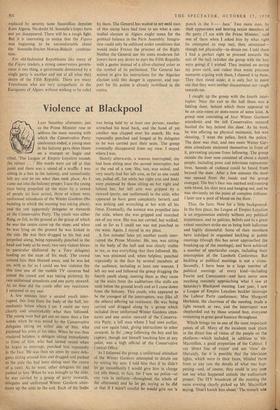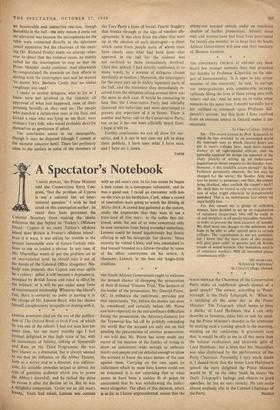Violence at Blackpool
LAST Saturday afternoon, just as the Prime Minister rose to address the mass meeting with which the Conservative Party conference ended, a young man in the balcony gave three blasts on a trumpet or bugle and cried, 'The League of Empire Loyalists sounds the retreat . . .' His words were cut off at that point and there was a sound of a scuffle. I was sitting in a box in the balcony, and immediately left my seat to see what then took place. As I came out into the-balcony proper, I saw the young man being propelled up the stairs by a crowd of people (at least seven), three of whom were uniformed attendants of the Winter Gardens (the building in which the meeting was taking place), and the rest apparently delegates or stewards of the Conservative Party. The youth was either flung, or fell, to the ground as the group of which he was the centre came up the steps, and when he was lying on the ground he was kicked in the side. He was then dragged to his feet and propelled along, being repeatedly punched in the head and body as he went; two very violent blows in particular (delivered by a Tory delegate) landing on the nape of his neck. The crowd around him then thinned away, and he was led on, with as far as I could see less violence (by this time one of the mobile TV cameras had joined the crowd and was taking pictures), by two uniformed attendants and one party steward. At no time did the youth offer any resistance. I returned to my seat.
A few minutes later a second youth inter- rupted, this time from the body of the hall, im- mediately below where I sat. I could see very clearly and unmistakably what then followed. The young man had got out no more than a few words when he was seized by the Conservative delegates sitting on either side of him, who pinioned his arms at his sides. When he was thus rendered helpless, a delegate sitting immediately in front of him, who had turned round when he began to interrupt, punched him repeatedly in the face. He was then set upon by more dele- gates sitting around him and dragged and pushed to the aisle (he had been sitting near the centre of a row). As he went, other delegates hit and pushed at him. When he was brought to the aisle, he was carried by a group of party stewards, delegates and uniformed Winter Gardens atten- dants up the aisle to the exit. Each of his limbs was being held by at least one person; another wrenched his head back, and the hand of yet, another was clapped over his mouth. He was repeatedly punched and hinged at by delegates as he was carried past their seats. The group eventually disappeared from my view. I stayed where I was.
Shortly afterwards, a woman interrupted; she had been sitting near the second interrupter, but at the end of a row. She, too, was seized, and very nearly had her left arm, as far as one could see, pulled off; for while her right arm and body were pinioned by those sitting on her right and behind her, her left arm was gripped by a steward (party, not uniformed) in the aisle, who appeared to have gone completely berserk and was jerking and wrenching at her with all his force. Eventually, the woman was propelled into the aisle, where she was gripped and marched out of my view. She was not carried, but walked, and as far as I could see was not punched as she went, Again, I stayed in my place.
A few minutes' later yet another youth inter- rupted the Prime Minister. He, too, was sitting in the body of the hall and was clearly visible to me, as was everything that then followed. He, too, was pinioned and, when helpless, punched repeatedly in the face by several members of the audience, including at least one woman. I left my seat and followed the group dragging the fourth youth along, meeting them as they came up the stairs from the auditorium (the stalls are sunk below the ground level) and as I came down from the balcony. This youth, who appeared to be the youngest of the interrupters, was (like all the others) offering no resistance. He was being carried and dragged along by a group which included three uniformed Winter Gardens atten- dants and one senior steward of the Conserva- tive Party, a tall man whom I had seen earlier, and saw again later, giving instructions to other stewards. In the group following the boy and his captors, though not himself touching him at any point, was a high official of the Conservative Central Oflice.
As I followed the group, a uniformed attendant of the Winter Gardens attempted to detain me by seizing my arm. I told him that if he didn't let go immediately 1 would give him in charge (an idle threat, in fact, for I saw no police—at any rate in uniform—throughout the whole of the afternoon) and he let go, saying as he did so that if I wasn't careful he would give me 'a punch in the f— face.' Two more men, by their appearance and bearing senior members of the party ('I am with the Prime Minister,' said one of them when I asked him by what right he attempted to stop me), then attempted— though not physically—to detain me. I told them I had a perfect right to proceed towards the exit of the halt (whither the group with the boy were going) if I wished. They insisted on seeing thy press card, and rather than waste precious moments arguing with them, I showed it to them. They then stood aside; it is only fair to point out that they were neither discourteous nor rough towards me.
I caught up the group with the fourth inter- rupter. Near the exit to the hall there was a folding door, behind which there appeared to be an ante-room or store-room of some kind. A group now consisting of four Winter Gardens attendants and the tall Conservative steward hustled the boy behind this door. As he went, he was offering no physical resistance, but was shouting, 'I want the police, fetch the police.' The door was shut, and two more Winter Gar- dens attendants stationed themselves in front of it, preventing anyone from following. The group outside the door now consisted of about a dozen people, including press and television representa- tives. ' Sounds of violence could be heard from beyond the door. After a few minutes the door was opened from the inside and the group emerged. The boy's face was marked and running with blood, his shirt torn and hanging out, and he was obviously on the point of complete collapse. I later saw a pool of blood on the floor.
Thus, the facts. Now for a little background. In the first place, the League of Empire Loyalists is an organisation entirely without any political importance, and its policies, beliefs and to a great extent members strike me as being both ludicrous and highly distasteful. Some of their members have indulged in organised heckling at public meetings (though this has never approached the breaking-up of the meetings), and have achieved a number of spectacular coups, including their interruption of the Lambeth Conference. But heckling at political meetings is not a crime. Secondly, 1 have been to a large number of political meetings of every kind—including Fascist and Communist—and have never seen anything remotely approaching what I saw at Saturday's Blackpool meeting. Last year, I saw a League of Empire Loyalists heckler interrupt the Labour Party conference; Miss Margaret Herbison, the chairman of the meeting, made a light remark or two, and the interrupter was shepherded out by those around him, everyone remaining in great good humour throughout.
Which brings me to one of the most important points of all. Many of the incidents took place in the direct line of vision of the people on the platform—which included, in addition to Mr. Macmillan, a good proportion of the Cabinet. I say 'direct line of vision' and not 'view' de- liberately, for it is possible that the television lights, which were in their faces, blinded them from at any rate the details of what was hap- pening—and, of course, they could in any case not see what happened outside the auditorium proper. The ITV broadcast of the meeting the same evening clearly picked up Mr. Macmillan saying, 'Don't knock him about.' The remark was an honourable and instinctive reaction, though inaudible in the hall—the only reason it came out on'television was because the microphones on the table were connected directly to the television sound apparatus, but the chairman of the meet- ing (Sir Richard Proby) made no attempt what- ever to direct that the Violence cease; he merely called for the interruption to stop so that the Prime Minister could continue. And afterwards he congratulated the stewards on their efforts in dealing with the interrupters and said he wanted 'to assure Mrs. Barbara Castle that no undue roughness was used.'
1 spoke to several delegates, who as far as I know were not involved in the violence; all approved of what had happened, most of them grinning broadly as they said so. The people Who punched a defenceless man in the face, and kicked a man who was lying on the floor, were ordinary Tory folk, who would probably describe themselves as gentlemen if asked.
The conclusion seems to me inescapable, though it may be disputed (though I cannot at the moment conceive how). There lies perilously close to the surface in some of the members of the Tory Party a layer of brutal, Fascist thuggery that breaks through at the sign of resolute dis- agreement. It was clear from the cheer that went up at the ejection of each interrupter—a cheer which came from people some of whom must have clearly seen what had been done—that approval in the hall for the violence was not confined to those immediately involved. (And this, indeed, I had directly confirmed, in so many words, by a number of delegates chosen absolutely at random.) Moreover, the interrupters for the most part sat in widely separated parts of the hall, and the treatment they immediately re- ceived from the delegates sitting around them was the same in each case. It would be reassuring to hear that the Conservative Party had officially disowned this behaviour and were determined to prevent any repetition of it in future. There is another and better side to the Conservative Party, but so far it has not been officially heard from. I hope it will be.
Further conclusions we can all draw for our- selves, and it is not in any case my job to draw them publicly. I have seen what I have seen, and I have set it down.
TAPER



































 Previous page
Previous page